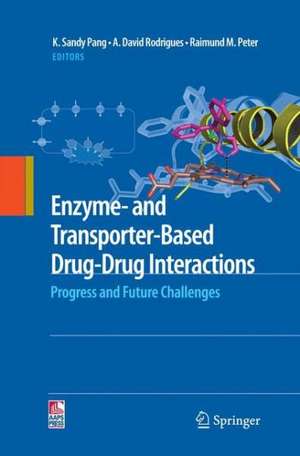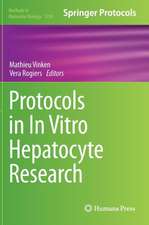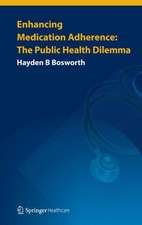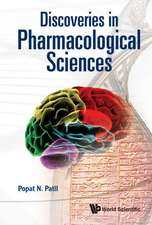Enzyme- and Transporter-Based Drug-Drug Interactions: Progress and Future Challenges
Editat de K. Sandy Pang, A. David Rodrigues, Raimund M. Peteren Limba Engleză Paperback – 25 noi 2014
During the past ten to fifteen years, we have come to realize that transporters, in addition to enzymes, play a vital role in drug elimination. Such insight has been possible because of the continued growth in PK-ADME (pharmacokinetics-absorption-distribution-metabolism-excretion) knowledge, fueled by further advances in molecular biology, greater availability of human tissues, and the development of additional and sophisticated model systems and sensitive assay methods for studying drug metabolism and transport in vitro and in vivo. This has sparked an in-depth probing into mechanisms surrounding DDIs, resulting from ligand-induced changes in nuclear receptors, as well as alterations in transporter and enzyme expression and function. Despite such advances, the in vitro and in vivo study of drug interactions and the integration of various data sets remain challenging. Therefore, it has become apparent that a proceeding that serves to encapsulate current strategies, approaches, methods and applications is necessary.
As Editors, we have assembled a number of opinion leaders and asked them to contribute chapters surrounding these issues. Many of these are the original Workshop speakers whereas others had been selected specially to contribute on topics related to basic and applied information that had not been covered in other reference texts on DDI. The resulting tome, entitled Enzyme- and Transporter-Based Drug Interactions: Progress and Future Challenges, comprises of four sections. Twenty-eight chapters covering various topics and perspectives related to the subject of metabolic and transporter-based drug-drug interactions are presented.
| Toate formatele și edițiile | Preț | Express |
|---|---|---|
| Paperback (1) | 1435.28 lei 6-8 săpt. | |
| Springer – 25 noi 2014 | 1435.28 lei 6-8 săpt. | |
| Hardback (1) | 1440.40 lei 6-8 săpt. | |
| Springer – 3 ian 2010 | 1440.40 lei 6-8 săpt. |
Preț: 1435.28 lei
Preț vechi: 1510.81 lei
-5% Nou
Puncte Express: 2153
Preț estimativ în valută:
274.67€ • 285.13$ • 229.03£
274.67€ • 285.13$ • 229.03£
Carte tipărită la comandă
Livrare economică 24 martie-07 aprilie
Preluare comenzi: 021 569.72.76
Specificații
ISBN-13: 9781489994899
ISBN-10: 1489994890
Pagini: 764
Ilustrații: XVIII, 746 p.
Dimensiuni: 155 x 235 x 40 mm
Greutate: 1.05 kg
Ediția:2010
Editura: Springer
Colecția Springer
Locul publicării:New York, NY, United States
ISBN-10: 1489994890
Pagini: 764
Ilustrații: XVIII, 746 p.
Dimensiuni: 155 x 235 x 40 mm
Greutate: 1.05 kg
Ediția:2010
Editura: Springer
Colecția Springer
Locul publicării:New York, NY, United States
Public țintă
Professional/practitionerCuprins
Determinants of Drug ADME.- Enzymatic Basis of Phase I and Phase II Drug Metabolism.- Transporters: Importance in Drug Absorption, Distribution, and Removal.- ADME Pharmacogenetics and Its Impact on Drug–Drug Interactions.- Impact of Nuclear Receptors CAR, PXR, FXR, and VDR, and Their Ligands On Enzymes and Transporters.- Impact of Physiological Determinants: Flow, Binding, Transporters and Enzymes on Organ and Total Body Clearances.- Methods For The Study Of Drug-Drug Interactions.- In Silico Approaches to Predict DDIs.- In Vitro Techniques to Study Drug–Drug Interactions of Drug Metabolism: Cytochrome P450.- The In Vitro Characterization of Inhibitory Drug–Drug Interactions Involving UDP-Glucuronosyltransferase.- In Vitro Techniques to Study Transporter-Based DDI.- In Vitro Techniques to Study Drug–Drug Interactions Involving Transport: Caco-2 Model for Study of P-Glycoprotein and Other Transporters.- Use of In Vivo Animal Models to Assess Drug–Drug Interactions.- Extrapolation of In Vitro Metabolic and P-Glycoprotein-Mediated Transport Data to In Vivo by Modeling and Simulations.- Translation of In Vitro Metabolic Data to Predict In Vivo Drug–Drug Interactions: IVIVE and Modeling and Simulations.- Absorption Models to Examine Bioavailability and Drug–Drug Interactions in Humans.- Management of Drug Interactions of New Drugs in Multicenter Trials Using the Metabolism and Transport Drug Interaction Database©.- Web-Based Database as a Tool to Examine Drug–Drug Interactions Involving Transporters.- Impact Of Drug-Drug Interactions.- Drug Disposition and Drug–Drug Interactions: Importance of First-Pass Metabolism in Gut and Liver.- Transporter-Based Drug–Drug Interactions and Their Effect on Distribution Volumes.- Inactivation of Human Cytochrome P450Enzymes and Drug–Drug Interactions.- Allosteric Enzyme- and Transporter-Based Interactions.- The Impact and In Vitro to In Vivo Prediction of Transporter-Based Drug–Drug Interactions in Humans.- Herbal Supplement-Based Interactions.- Anticipating and Minimizing Drug Interactions in a Drug Discovery and Development Setting: An Industrial Perspective.- Clinical Studies of Drug–Drug Interactions: Design and Interpretation.- Toxicological Consequences of Drug–Drug Interactions.- Regulatory Aspects And Future Developments Involving DDI.- Complex Drug Interactions: Significance and Evaluation.- Drug–Drug Interactions: Communicating Post-market Drug Safety Information in the USA.- Drug–Drug Interactions: What Have We Learned and Where Are We Going?.
Notă biografică
K. Sandy Pang Ph.D. is Professor of Pharmacy and Pharmacology, Faculties of Pharmacy and Medicine at the University of Toronto. She received her B.S. (Pharmacy) from the University of Toronto, Ph.D. (Pharmaceutical Chemistry) from UCSF and post-doctoral training with Dr. James R. Gillette as a Fogarty International Fellow at the National Institutes of Health. Dr. Pang’s work spans the fields of pharmacokinetics, drug metabolism and transporters and their regulation. Her research programs are aimed towards a mechanistic-based understanding of the handling of drugs and their metabolites within the liver, the intestine, and kidney via integration of relevant processes into physiologically-based models, encompassing state-of-the-art experimentation and theory. Her work emphasizes the presence of immediate removal of formed metabolites in situ the eliminating organ that reveals differences in the fates of formed vs. preformed metabolites because of transmembrane barriers, enzyme heterogeneity, enzymatic coupling, and kinetics of successive formation of metabolites. Recent studies focused on the continuation of metabolite PBPK modeling, siRNA disposition, and the role of 1a,25-dihydroxyvitamin D3-liganded vitamin D receptor on the regulation of transporters and enzymes. Dr. Pang has published over 200 original articles and chapters. She has served on various committees for NIH ASPET, AAPS, ISSX, and AAAS. She is the editor-in-chief of Biopharmaceutics and Drug Disposition, and is a member of the editorial review boards of the American Journal of Physiology, Journal of Pharmacology and Experimental Therapeutics, Drug Metabolism and Disposition, and AAPS Journal. She was the recipient of the NIH Research Career Development Award, Faculty Development award from the Medical Research Council of Canada, the McNeil Award from the Faculties of Pharmacies in Canada, and the Research Achievement Award in Pharmacokinetics,Pharmacodynamics and Drug Metabolism from the American Association of Pharmaceutical Scientists (AAPS).
A. David Rodrigues is Executive Director of the Metabolism & Pharmacokinetics Department, Pharmaceutical Candidate Optimization, at Bristol-Myers Squibb, Princeton, New Jersey. The author and co-author of over ninety peer-reviewed journal articles and book chapters, Dr. Rodrigues sits of the Editorial Board of three journals (Drug Metabolism and Disposition, Current Drug Metabolism, and Drug Metabolism Letters) and is member of the International Society for the Study of Xenobiotics (ISSX) and the American Association of Pharmaceutical Scientists (AAPS). He received the B.Sc. degree (1984) in applied science from Kingston-upon-Thames Polytechnic, Surrey, England, and the Ph.D. degree (1988) in biochemistry from the University of Surrey, Guildford, England.
Raimund M. Peter is Associate Director of the Drug Metabolism & Pharmacokinetics Section, Cardiovascular & Gastrointestinal Research Department, at AstraZeneca, Alderley Park, United Kingdom. The author and co-author of twenty peer-reviewed journal articles, Dr. Peter is the current Chairman of the Drug Metabolism Focus Group of AAPS and is member of the International Society for the Study of Xenobiotics (ISSX), the American Association of Pharmaceutical Scientists (AAPS), and the American Chemical Society. He received the Dipl.-Chem. degree (1986) in chemistry, and the Ph.D. degree (1992) in chemistry & biochemical pharmacology from the University of Erlangen-Nuernberg, Germany.
A. David Rodrigues is Executive Director of the Metabolism & Pharmacokinetics Department, Pharmaceutical Candidate Optimization, at Bristol-Myers Squibb, Princeton, New Jersey. The author and co-author of over ninety peer-reviewed journal articles and book chapters, Dr. Rodrigues sits of the Editorial Board of three journals (Drug Metabolism and Disposition, Current Drug Metabolism, and Drug Metabolism Letters) and is member of the International Society for the Study of Xenobiotics (ISSX) and the American Association of Pharmaceutical Scientists (AAPS). He received the B.Sc. degree (1984) in applied science from Kingston-upon-Thames Polytechnic, Surrey, England, and the Ph.D. degree (1988) in biochemistry from the University of Surrey, Guildford, England.
Raimund M. Peter is Associate Director of the Drug Metabolism & Pharmacokinetics Section, Cardiovascular & Gastrointestinal Research Department, at AstraZeneca, Alderley Park, United Kingdom. The author and co-author of twenty peer-reviewed journal articles, Dr. Peter is the current Chairman of the Drug Metabolism Focus Group of AAPS and is member of the International Society for the Study of Xenobiotics (ISSX), the American Association of Pharmaceutical Scientists (AAPS), and the American Chemical Society. He received the Dipl.-Chem. degree (1986) in chemistry, and the Ph.D. degree (1992) in chemistry & biochemical pharmacology from the University of Erlangen-Nuernberg, Germany.
Textul de pe ultima copertă
This volume is authored by esteemed experts in the field, and provides state-of-the art knowledge related to enzyme- and transporter-based DDIs that impact the absorption and disposition of drugs. It examines the types of DDIs, methodological approaches to evaluate and view DDIs mechanistically, bioinformatics, clinical and toxicological outcomes, and regulatory recommendations. As much as possible, the future challenges and opportunities that lie ahead are presented and discussed. Special emphases are placed on the quantitative assessment of the roles of different transporters, need for more specific probes and inhibitors, and recognition of extrahepatic eliminating organs. Future approaches should integrate transporters and enzymes to accelerate the development of physiological based-pharmacokinetic models (PBPK-DDI) and information related to inter-subject variability. In addition, the authors look beyond small molecules and consider DDIs involving biologic agents, such as therapeutic antibodies, that can bring about pharmacologically significant drug-cytokine or drug-endocrine interactions.
Caracteristici
Includes supplementary material: sn.pub/extras








